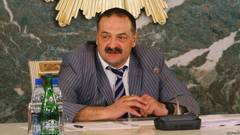State Duma Members Call on Russian President to Abolish Federal Districts
On April 4, the Russian newspaper Nezavisimaya Gazeta reported that a group of State Duma deputies are preparing to call on the country’s president and government to reform or even abolish the federal districts in the Russian Federation. Removing the federal districts from the Russian administrative map would save the government about $50 million a year, but cutting costs is not the main aim of the legislators. Rather, opponents of the federal districts regard them as inefficient and outdated. Back in 2000, when President Vladimir Putin decreed the federal districts into existence, presidential representatives were needed in the districts to oversee the implementation of his policies. However, as the central government’s capacity increased over time and the regional governors became completely docile figures, there was no longer a need for additional Moscow envoys (Nezavisimaya Gazeta, April 4).
Initially, back in 2000, seven federal districts were designated, encompassing the entire country. In 2010, the North Caucasus Federal District was created out of the North Caucasus republics and Stavropol region, which were previously part of the Southern Federal District. After the annexation of Crimea in 2014, Moscow promptly set up the Crimean Federal District, which is made up of only two regions—the city of Sevastopol and the rest of the Crimean peninsula.
According to rights activists, one possible useful function of the federal districts in Russia could have been providing an administrative counterweight to the regional authorities, but the districts did not live up to such high expectations. According to Russian Presidential Council for Human Rights member Ilya Shablinsky, despite the fact that the powers of Moscow’s envoys were markedly expanded several years ago, they seem superfluous in the current political context. Shablinsky told Nezavisimaya Gazeta: “Russian governors have become figures that are under the complete control of the Kremlin, and in this context the role of presidential representatives in the federal districts becomes quite unclear. They look like confusing addendums to regional leaders who work now directly with the federal center” (Nezavisimaya Gazeta, April 4).
Not all federal districts are seen as redundant, however: even the author of the initiative to abolish the federal districts, Vadim Solovyov of the Communist Party of the Russian Federation (KPRF), says they may still be needed in the North Caucasus and in the Volga region, where the situation is not as stable as elsewhere in Russia. Others, such as Just Russia’s representative in the Russian State Duma, Mikhail Yemelyanov, suggest that the government should only cut the financing to the federal districts, but keep them as a safety backup political mechanism. According to Yemelyanov, direct elections of governors in Russia made it possible for some “unwanted” individuals to be elected as governors, but when direct elections for the heads of the region were abolished and the governors were appointed, the need for Moscow’s envoys disappeared. Even now, since popular elections for governors have been reinstituted, the so-called “municipal filter” can weed out candidates that Moscow does not like. However, Yemelyanov warns that with the economic situation worsening, the filters may not work and candidates disliked by the Russian president may again run for governor. In such cases, according to Yemelyanov, Moscow may revive and bolster the institution of the presidential envoy to reign in the governors (Nezavisimaya Gazeta, April 4).
Even if the Kremlin decides to do away with the federal districts and their administrative apparatus, the North Caucasian Federal District appears to be here to stay, at least for the time being. Indeed, Moscow’s envoy to the district, Sergei Melikov is perhaps the most widely cited representative of the Russian president. Even Melikov, however, primarily focuses on the problems of Dagestan, partly because of his Lezgin background and partly because Dagestan is currently the most volatile place in the North Caucasus and in the entire Russian Federation. Melikov plays the role of an administrative counterbalance to the regional governors in the North Caucasus, serving as a substitute for a system of democratic checks and balances. However, such powerful regional figures as Chechnya’s Ramzan Kadyrov practically ignore Moscow’s envoy. Indeed, Kadyrov never visits Melikov’s gatherings with other regional governors (Kavkazskaya Politika, March 31).
Melikov’s example shows that Moscow’s envoys in the regions cannot really play a serious managerial role, because the problems of the regions vary so much and they are so far apart from one another that effective administrative management is not feasible. Yet, Moscow seems intent on retaining the institution of the envoys, as the authorities are uncertain about how the situation in the country will develop given the economic crisis that is still unfolding in the country. If, however, Moscow still abolishes the districts, it is unlikely to do so in the North Caucasus, which will make this restive peripheral region stand out in the Russian Federation once again as a place that is part of the country officially, but receives special treatment by Moscow.

